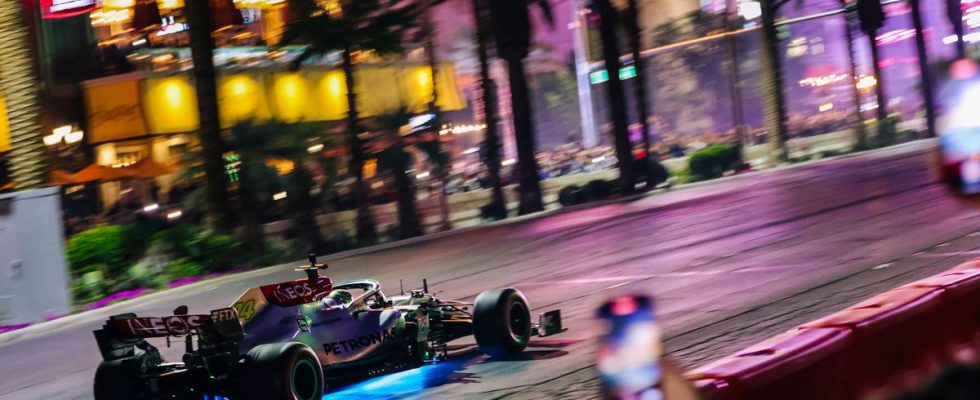From our correspondent in the United States,
Lewis Hamilton promised “the greatest race of all time”. An urban circuit, at night, with F1 cars hurtling down the Las Vegas strip at 340 km/h, passing Caesars Palace, the Bellagio and the new Sphere. But if the neon lights and casinos of Sin City offer on paper a disproportionate setting that matches the ambitions in America of Formula 1 and its owner Liberty Media, the $500 million bet seems far from the success announced. While Max Verstappen and Red Bull have long since folded the title race, the price of tickets and hotel rooms is plummeting, and the anger of local residents is brewing in the face of closed roads and works.
Prices halved or more
Tuesday, the grand prize was far from being sold out. While Liberty Media is counting on 100,000 daily spectators from Thursday to Saturday evening, thousands of tickets remain unsold, according to estimates from the specialist site Oversteer48.com.
The Las Vegas grand prix is the most expensive of the season, even more than that of Monaco. Currently, a three-day pass starts at $1,869 on the official website and a ticket for Saturday night’s race starts at $1,215. But you can find them at half price on resale sites like Stubhub or Ticketmaster. And if demand continues to lag behind supply, the decline is likely to continue.
The trend is even more extreme for the hotel industry. When the race was announced a year ago, rooms were going for more than triple the usual rates: between $650 and $900 for the most affordable establishments on the strip (Excalibur, Circus Circus, Sahara, Harrah, Flamingo, Ballys, in particular). Today, you can find them for between 80 and 150 dollars.
“It’s not unusual,” says Jeremy Aguero of the analytics firm Applied Analysis. “Las Vegas welcomes around 300,000 people every weekend. With 140,000 people for F1, the tourists who occupy (or not) the other rooms exert downward pressure on prices. »
Monster investments
Unlike other grands prix, which are outsourced to local independent promoters, Liberty Media, which bought F1 for eight billion dollars in 2017, is the race organizer. Billionaire John Malone’s group invested nearly $500 million to acquire land a stone’s throw from the strip and build the stands and paddock, which could in the future be visited by tourists.

On the concert side, Liberty Media did not skimp: the show will be provided by Tiësto and Steve Aoki, Major Lazer and John Legend. There are obviously after-parties, including the Sports Illustrated one with David Beckham and Shaquille O’Neal.
After reviving interest in F1 in the United States by co-producing the Netflix documentary series Drive to Survive, Liberty Media is riding the recent transformation of Las Vegas into the new Mecca of sport. Until 2017, the gaming capital of the world was devoid of any sports franchise. First there was hockey, with the Golden Knights, champions this year, then American football, with the move of the Raiders, who moved in 2020 to a brand new stadium which will host the Super Bowl next February.
One question remains: is there room for three American grands prix out of 24 races, after Austin and, since last year, Miami? According to Jeremy Aguero, it is “too early” to know if the economic benefits of the grand prize, projected at $1.3 billion for the Las Vegas region, will be at this level.
Angry local residents and tourists
“Fountains have been cut off, canals drained, streets closed, it’s stripmageddon,” said Michael Green, a Las Vegas history professor interviewed by the AP agency. He’s barely exaggerating. The fountains of the Bellagio, one of the most photographed attractions in the United States, are barely visible behind grandstands, and the canals of the Venetian have been emptied to accommodate a VIP area. On the traffic side, traffic is closed on Las Vegas Bl, with traffic jams in the bypass zones, and long detours via elevated walkways for pedestrians.
Little sporting interest
The race, penultimate of the season, could have been decisive. But with world titles long since acquired by Max Verstappen and Red Bull among constructors, there is no longer any real suspense. Liberty Media, however, is playing big: in the early 1980s, the Las Vegas grand prix, which had turned into a “parking lot race” on a tiny field, only survived two years.

